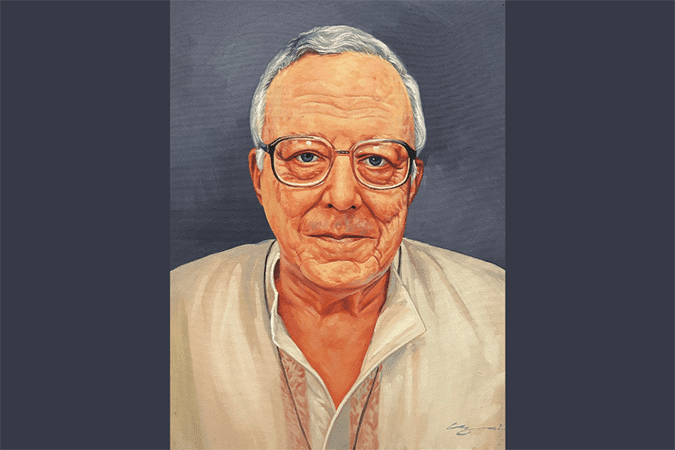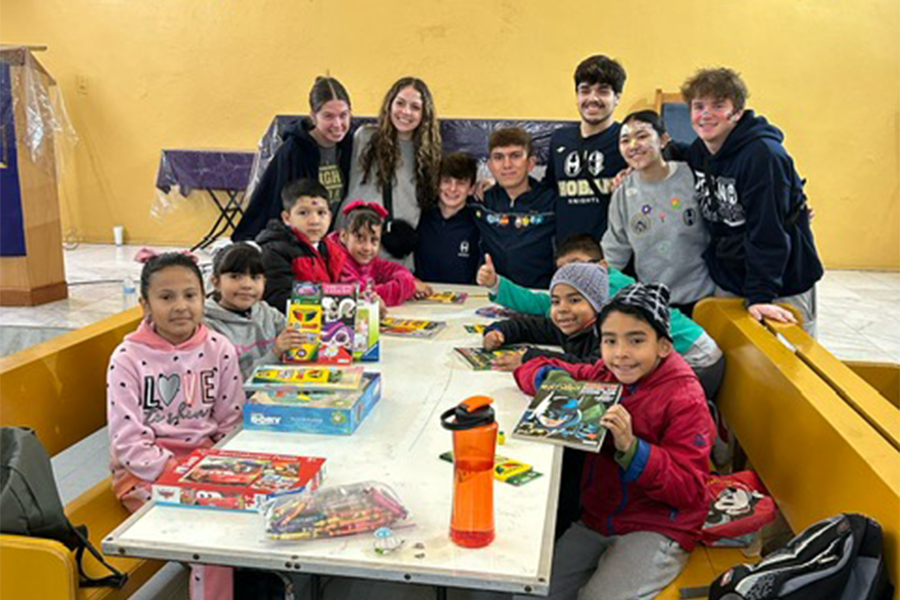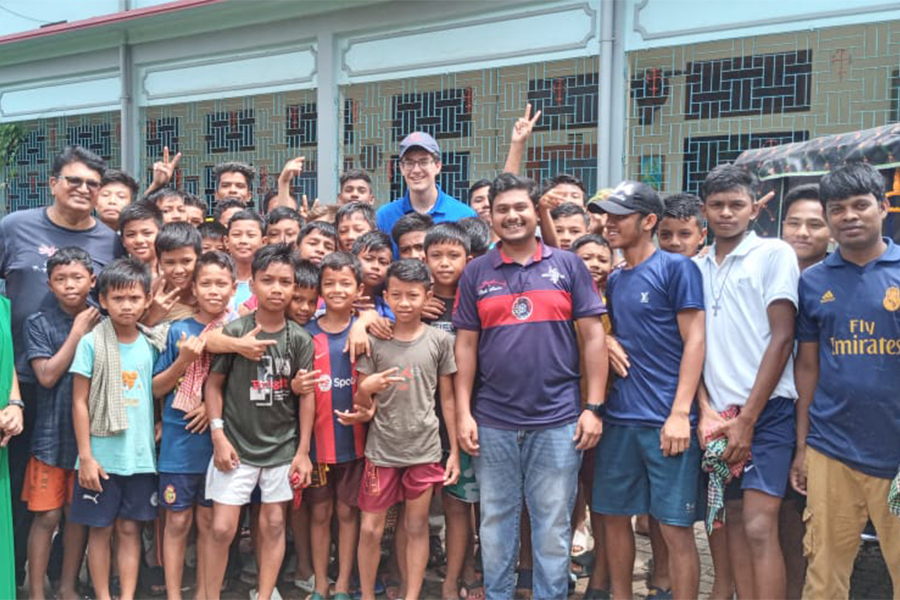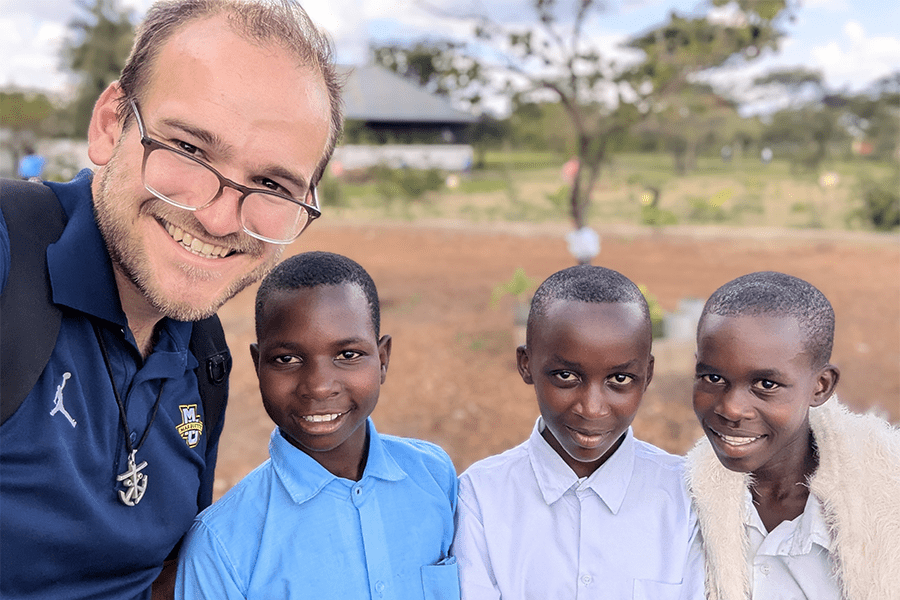
The Holy Cross Mission Center staff were grateful to host Fr. Frank Quinlivan, C.S.C., these past few years during his visits to family, friends, and benefactors in the U.S. Sadly, Fr. Frank passed away earlier this year, and as a tribute to him, we are sharing some reflections on his witness as a Holy Cross missionary priest.
The first tribute was composed by Fr. Patrick Gaffney, C.S.C., the Vice-Chancellor of Notre Dame University Bangladesh:
As we approach Easter this year, the students, teachers, and staff at Notre Dame University Bangladesh will look around and notice something unusual. Someone is missing. The familiar smile, the helping hand, and the encouraging words of Fr. Frank Quinlivan, C.S.C., that have always been a core part of what we do will not be seen or heard. At the end of January, after a short stay in a Dhaka hospital, Fr. Frank left this world to be home with God.
Fr. Frank, who grew up in Chicago, was ordained a Holy Cross priest in 1970. After that, he worked at several inner-city parishes in and around South Bend before leaving for Bangladesh in 1979. Here he spent his first several months learning the language which he came to master and put to good use in the parishes, schools, and finally, this university where he had a profound impact, though he was always shunning the spotlight.
He was the Provincial Superior of the Holy Cross priests in Bangladesh eleven years ago when the plans to establish Notre Dame University Bangladesh became serious and required strong forward-looking leadership. Once the institution opened its doors in December 2014, Fr. Frank took on several tasks, including teaching a class to help new students improve their English language skills. Along the way, he compiled and published a very useful 200-page handbook of English words and idioms with their Bengali equivalents. But he also set to work with other tasks which provided the largely inexperienced administration with guidance and support.
Fr. Frank played a key role in forming and implementing NDUB’s waiver and scholarship practices, including raising funds for this purpose, which became especially critical during the COVID-19 pandemic. At that time, sudden financial distress struck many local families leaving eager students without the resources needed to pay tuition. Likewise, he set in motion valuable extracurricular projects that emphasized a concrete understanding of social responsibility, human rights, ethical awareness, and the common good.
Fr. Frank was NDUB’s moral compass, and his contributions infused a sense of purpose in every facet of the University. In fact, it was Fr. Frank who, inspired by the text of the Constitutions of the Congregation of Holy Cross, developed the school’s motto: ‘The competence to see and the courage to act’ – a guiding principle that will shape the aims and aspirations of our students and faculty for generations to come.
Below, you will find a heartfelt tribute written by Mintu Deshwara, a former student whose life was changed by Fr. Frank.
Mintu, now a Bangladeshi journalist, first met Fr. Frank while living in Sreemangal, a region of indigenous minorities of Bangladesh. This powerful reflection exemplifies the impact that Fr. Frank had on countless lives during his three decades of service in the country.
Born into a family of tea workers, I grew up listening to stories of the cruelty of the fair-skinned nationals towards the poor tea pickers.
However, all those preconceived notions were erased from my tender mind when I encountered Fr. Frank Quinlivan, a Holy Cross priest who arrived in Bangladesh in 1979, from his hometown in Chicago.
Ordained as a priest in 1970, I first met Fr. Frank after he came to St. Joseph’s Church in Sreemangal as the new parish priest in 1994, dedicating his life and knowledge to the Punjee people for the next decade.
I still remember him walking towards me in his pale white t-shirt, loose trousers, a pair of Sandak sandals on his feet, and a cross hanging around his neck, whose shine was dimmed by the radiant smile on his face.
Alongside his huge heart, the clarity in his tone when he spoke Bangla is what struck me the most during the first time I met this saint, still unknown how he would turn out to be my guardian angel.
Our family was in a very difficult time when this American missionary entered my life. My younger brother Raju had just been born and I had to go to the estates to work, covering for my mother.
With four children to feed, education was a luxury I never thought I would be able to afford until Fr. Frank set up a boarding facility for children with free education.
With my father leaving me at the hostel, I found 16 others like me, most belonging to tea-worker families while a handful hailing from the Garo and Khasi communities. He also ensured that we all were fed and taught, and made visits to the estates at least once every month.
At that time, it was a rare sight to spot a foreigner in the estates. Most visitors would be accompanied by someone from the owners’ side while most foreigners never visited the workers’ colonies.
However, Fr. Frank visited us often, making himself comfortable on a small stool as we had no chairs to offer him. He soon won over the Punjee dwellers who ran to him each time they were distressed.
His conversations would lead to how education was the only hope as its light can ward off all darkness from their lives.
One day, he surprised me with his strong will. It was perhaps the only day I had seen anger on his face and desperation in his eyes.
The incident happened when he tried to take 10 sick female tea workers to Dhaka for treatment on a bus.
Unable to find seats for them, he fought hard against the driver and helper to accommodate the women inside the bus, until they finally gave up.
With time, Fr. Frank got old but his magical wand kept helping hundreds, including orphans, who wished to pursue higher studies.
Take my case for instance, as I would not have been here today if he had not taken me off the meadows where I grazed cows and admitted me to his school first, then at Notre Dame College.
I had left home with only a torn blanket from my mother, which Fr. Frank had asked me to save while I used a new one that he had bought for me before I went to Dhaka.
He told me to have courage and have an honest heart. It was for him that I did not lose my way as his letters never stopped coming my way till I graduated and went back to my family.
However, with time, we lost touch, only to be reunited after all was over.
It was when his eyes became weaker and his arms became frail. But his heart was still strong, filled with hope and love for the poor and needy.
Battling old-age complications, neither did Fr. Frank wish to be admitted into a famous hospital, nor did he board his flight to Thailand where a wheelchair was waiting at the airport in Bangkok to take him to some of the best doctors.
Departing with a promise to host no program after he bid farewell, he passed away silently on January 28, on a hospital bed at the capital at the age of 81.
Now he rests at Holy Cross priest’s cemetery in Bhadun in Gazipur while his students like me live on to narrate his legacy.
Fr. Frank’s obituary in the South Bend Tribune can be found here.
Thank you to the Sisters of the Holy Cross for hosting Fr. Frank’s Memorial Mass at the Chapel of Our Lady of Loretto on St. Mary’s College campus on February 10, 2024. You can watch a recording of this Memorial Service here. Between minute-markers 21:20 and 31:30, you will find a moving homily on Fr. Frank’s life given by Fr. Edward “Monk” Malloy, C.S.C., former president of the University of Notre Dame.
Memorial contributions can be made online to support the work of Holy Cross in Bangladesh: click here to donate.
Published: April 1, 2024

Student Essay Contest: “Thin Places: Where Heaven and Humanity Meet” by Kylene Coyle
We are pleased to present to you this second-place essay from the 2024 Holy Cross Missions Student Essay Contest, which invited students to reflect...

Ganguly Exchange Reflection: Home in the Sacred Heart of Jesus
The Holy Cross Mission Center is pleased to share written reflections from the Holy Cross participants in the 2024 Ganguly Exchange, an eight-week...

“Letters from Nyumbani”: Part III
In the “Letters from Nyumbani” series of reflections, Moreau seminarian Keenan Bross, C.S.C., will share his experiences during his pastoral year at...
